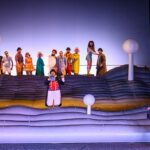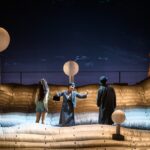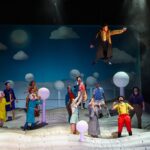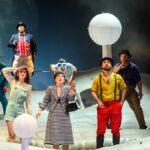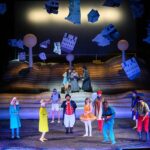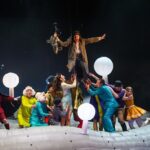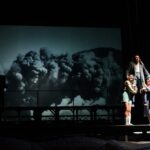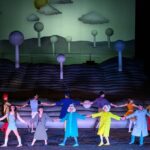October 26th | 21:00 – I.L. Caragiale National Theatre Bucharest, Studio Hall

The play The Air Pedestrian was written in 1962 and it premiered the same year in Düsseldorf, after which it was staged in France in 1963 at the Odéon Theater in Paris. It is the last text in the so-called Bérenger series, following The Merciless Killer, The Rhinos and The King Dies. This time, the famous Ionesconian protagonist becomes a playwright who has exhausted his creative resources and seeks to disconnect amid the idyllic landscape of rural England with his wife Joséphine and their daughter Marthe.
Shortly after, however, his space is populated by stereotypical representatives of the equally stereotypical British society, who collectively ignore the imminence of a new war and their total disappearance, trivializing unthinkable horrors through monotonous speeches. When Bérenger (re)discovers flight and soars into another plane of existence, the mob disowns him, mocking his apocalyptic prophecies.
Written during the Cold War, the text is both a warning and an exasperated cry in the face of social indifference.
[same_day_events_link]
By: Eugène Ionesco
Translated by: Vlad Russo și Vlad Zografi
Cast:
Mr. Bérenger: Matei Rotaru
Mrs. Bérenger (Joséphine): Anca Hanu
Miss Bérenger: Diana-Ioana Licu
The Journalist (English): Cristian Grosu
The First Englishman: Mihai-Florian Nițu
The First Englishwoman: Angelica Nicoară
The Little Boy, their son: Silvius Iorga
The Second Englishman: Miron Maxim
The Second Englishwoman: Patricia Brad
The Little Girl, their daughter: Cecilia Lucanu-Donat
John Bull: Radu Lărgeanu
The First Old Englishwoman: Irina Wintze
The Second Old Englishwoman: Elena Ivanca
Uncle-Doctor: Ioan Isaiu
The Mortuary Enmployee: Dan Chiorean
The Passerby from the Anti-World, The Man in White: Cătălin Codreanu
The Judge, The Executioner, The First Assessor: Ruslan Bârlea
Extra: Florin Ivănușcă
Directed by: Gábor Tompa
Set design: Adrian Damian
Costumes: Luiza Enescu
Stage movement: Ferenc Sinkó
Original music: Vasile Șirli
Video design: Radu Daniel
Stage design assistant: Dariana Pau
Saxophone: Patricia Marchiș
Producer: Lucian Blaga National Theatre Cluj-Napoca
Duration: 1h 45 min (no intermission)
Recommended age: 14+
Performance in Romanian with English subtitles
Sun, silence, green grass, birds chirping, the blue sky, children playing in the park, ideal conditions for a writer to find inspiration in their comfortable, intimate home… But things are never this simple. The world is not as it seems. A bomb doesn’t make a war, just as a sparrow flying by doesn’t mean spring is here. And yet? Bérenger, an idealist, an artist who loves life, people, light, suddenly discovers that he can fly – just as he can walk or breathe. In his naivety, he believes his family and everyone else can also fly, just like him, that they can understand, that they can “find the path, the forgotten path”; they only have to remember. But the artist is in fact the only air pedestrian, taking this solitary road, leaning into it gently, for momentum. A privileged position, which nonetheless causes pain and the curse of not being trusted. Because if beauty is accessible to everyone, the sublime and the grotesque are aesthetic experiences which trouble and frighten us. Just like the tragic choir did not believe in Cassandra’s dark premonitions, the English people spending their Sunday in the park do not believe in Bérenger’s apocalyptic visions, because truth is always an offence in the face of comfort, prudishness, superficiality, prejudice, and facile righteousness. But when “beyond hell… there is nothing”, and hell is closing in on us, like the wind, our comfortable world deflates, like an artificial décor, replacing the gardens with the abyss, ice, and flames.
Gábor Tompa, together with his artistic team, transforms Ionesco’s text in a musical score, playing both physically and vocally with the rhythm, the choral harmony, dissonance, and syncope, in poetic swings, oscillations, and leaps. The play is thus brought to the fore again, after being unjustly forgotten for so long, just like the characters – and, implicitly, we – have forgotten how to fly. Because who believes in poets anymore? And what are our ideals today? The intellectual’s pain comes from the fact that the internal combustion of authentic creativity happens precisely when one’s ideals are destroyed, when he is faced with the fear of death, of the abyss, of losing everything he loves. With his specific humor, Ionesco seems to ask us, even today, when the play is more relevant than ever, with Russian and Ukrainian bullets and rockets so close to us, with the planet soaked in blood and ecologically threatened: why do people keep pretending that they don’t see anything, why don’t they want to understand what is happening? The answer is not that different from the Biblical one: “they have eyes, but do not see, they have ears, but do not hear”. (Ștefana Pop-Curșeu)
Photo: © Lucian Blaga National Theatre Cluj-Napoca / Nicu Cherciu


